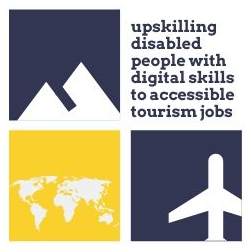As part of the TOURISTIC project, the partnership is currently developing training content for teachers, educators and volunteers working or supporting disabled people by helping them develop Digital Skills applied to the design of innovative commercial services and products in Online Accessible Tourism, creating new skills pathways and labour opportunities for disabled people in Europe, supporting ICT-based teaching and assessment practices and promoting the transparency, validation and recognition of skills and competences acquired through OER.

INQS, as part of this process, is responsible for developing the curriculum for Module 4: Commercial awareness & inclusive marketing communication. As part of this, INQS has been examining the use of resources to help support learning on Customer behaviour indicators
As a means of evaluating customer behaviour indicators, try to build up an overall image of your customers to gather data so you can predict or cater to their behaviour and requirements. There is a “Social Media Life Cycle” which outlines different users at different stages
- Lurkers: Observe only, do not contribute, occasional visitors
- Novices: Beginning to engage with community, participation and provision of content
- Insiders: Consistently add to the community, interact and rate others
- Leaders: Veteran Participants
- Elders: Leave the Network
Think about all of your users and try to identify where they may fit in this cycle to identify the right message for the right user. A lurker could be interested in the basic information and offers. An insider may be praised or rewarded for helping other users. An elder could be asked for information on what they would suggest or improve.
Think also about the 4 types of social media content you are providing and how this could align to your customer needs:
- Communication: What are you communicating? How is your communication perceived by your audience? Can/Do you measure its effectiveness? What strategies trigger the most beneficial responses from your audiences?
- Collaboration: Are you looking for Internal or External collaboration? Can you support knowledge sharing or feedback from customers? Do you have any other tools to gather data or collaborate? Can you reward participation?
- Education: How often do you need to educate your internal/external audience? Do you look for opportunities to do so? What tools or media is available to help with this
- Entertainment: Remember that entertaining does not always need to mean Funny and humour can often be misunderstood. Focus on interesting/compelling content as opposed to trying to make everything “funny”.